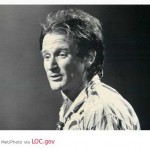 I’ve cried for three celebrity deaths: Kurt Cobain, whose music was a big part of my youth; Roger Ebert, whose reviews and writing were like a friendly voice for most of my life; and Robin Williams, whose characters in films such as “Dead Poets Society,” “Good Will Hunting” and “Good Morning Vietnam” connected with me.
I’ve cried for three celebrity deaths: Kurt Cobain, whose music was a big part of my youth; Roger Ebert, whose reviews and writing were like a friendly voice for most of my life; and Robin Williams, whose characters in films such as “Dead Poets Society,” “Good Will Hunting” and “Good Morning Vietnam” connected with me.
His death hits hard, even for those of us who knew him only as fans. We’re sad for his three children, now without their father, his wife, and longtime friends. We mourn the end of a gifted life in relative youth at sixty-three, and we feel compassion toward someone who spread joy throughout the world and yet was privately in pain, battling depression and substance abuse. His suicide resonates particularly among those affected by a similar loss; yet it hurts not just because of knowing his struggle. Those who loved him say Williams thrived on connecting with others, a yearning that enabled him to embody characters entwined with laughter as much as pathos.
At Word and Film, I focus a lot on adaptations — but Williams was an adaptive performer, not just an actor in adaptations. A comedian who could cycle through voices and personas faster than a rubber band snapping. A funny man who reinvented himself as an Oscar-winning dramatic actor. Someone who could go-for-broke one moment and become subdued in another, showing tenderness, angst, melancholy, even malevolence. His best work shows heart and sincerity, an everyman quality that transported audiences through his metamorphosis and back.
Read more in my tribute to him today here.
